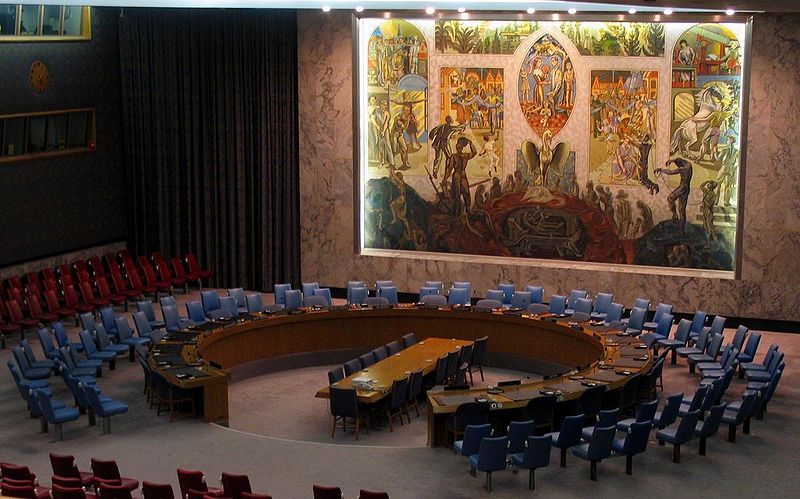Following UN Secretary General Ban Ki-moon’s formal announcement on Saturday of Syria’s accession to the 1992 Convention on the Prohibition of the Development, Production, Stockpiling and Use of Chemical Weapons and on their Destruction (Chemical Weapons Convention), the United States and Russia revealed their joint Framework for the Elimination of Syrian Chemical Weapons. The concurrent release of a UN report containing “clear and convincing” evidence of the use of chemical weapons in Syria increased the factual basis and urgency of efforts to remove chemical weapons from the ongoing conflict.

Credit:Bernd Untiedt
UN Report
Since the devastating attacks on August 21, 3013 in which hundreds of people died, the world has speculated about the use of chemical weapons in Syria. Now, the UN team investigating the use of chemical weapons in Syria has released a report which includes “clear and convincing” evidence of their use of in the attacks near Damascus on a “relatively large-scale.” [UN] The formal Report on the Alleged Use of Chemical Weapons in the Ghouta Area of Damascus on 21 August 2013, presented to Ban Ki-moon on September 15, contains explicit evidence supporting this conclusion including environmental and biological samples, medical examinations, and interviews with survivors. The data and testing prove that surface-to-surface rockets containing Sarin gas were used against Syrian civilians, including children. While the report itself does not identify those responsible for the use of chemical weapons in Syria, other analysts agree that the evidence implicates the Syrian government. [New York Times; Human Rights Watch]
Samantha Power, the U.S. Ambassador to the UN, is quoted as saying to the UN General Assembly:
For a crime of this magnitude, it is not enough to say ‘chemical weapons were used,’ any more than it would have been enough to say that ‘machetes were used’ in Rwanda in 1994. We must condemn the user, and here we must acknowledge what the technical details of the U.N. report make clear: only the regime could have carried out this large-scale chemical weapons attack, the largest attack in 25 years.
Chemical Weapons Convention
The report paints a grave picture of the situation, but Syria’s recent decision to become a party to the Chemical Weapons Convention may indicate a willingness to change existing policies. Syria announced its intent to sign the Chemical Weapons Convention last Thursday, followed immediately by a formal instrument of accession. [UN] Prior to this development, Syria was one of only seven countries that had not signed the Convention. [OPCW; Reuters] In taking this step, Syria is finally acknowledging the existence of chemical weapons. Ban Ki-moon described both the accession and the acknowledgment as “welcome developments” in a recent statement.
As a party to the Convention, Syria will be required to destroy all chemical weapons and the facilities that produce them. [OPCW] While the Convention will not enter into force for Syria until October 14, 2013, 30 days after the deposit of the instrument of accession, Syria has expressed its willingness to begin fulfilling its obligations prior to this date. [Reuters]
U.S.-Russia Framework
The U.S. – Russia Framework for the Elimination of Syrian Chemical Weapons calls for Syria to take immediate action to identify and destroy weapon caches in Syria. [UN] Under the joint framework, Syria would be required to compile a complete list of all chemical weapons, related materials, and production sites within one week and grant unrestricted access to all chemical weapons sites in the country. [U.S. State Dep’t] Officials from the United Nations and the Organization for the Prohibition of Chemical Weapons (OPCW) would work together to verify and destroy any chemical weapons stockpiled in Syria. [CNN] The U.S.-Russian joint framework sets an “ambitious” timetable for the destruction of all chemical weapons by mid-2014. [U.S. State Dep’t] It also calls for continual monitoring of Syria and in the event of non-compliance, including the transfer or use of chemical weapons, the imposition of measures under Chapter VII of the UN Charter, which allows for the possible use of military force. [U.S. State Dep’t]
UN Security Council
In a recent statement concerning the situation in Syria, the UN Secretary General urged the UN Security Council to ensure both compliance and enforcement of the framework through a clear resolution. The five permanent Security Council members (the United States, France, United Kingdom, Russia and China) have reportedly been meeting to negotiate the details of any forthcoming resolution. [New York Times; Reuters]
While Syria’s accession to the Chemical Weapon Convention and the development of the framework represent progress in the international community’s efforts to prevent further atrocities in Syria, chemical weapons are only one element of the problem. Syrian civilians continue to suffer appalling violations of their human rights as the conflict continues and the “vast majority” of deaths have been caused by conventional (not chemical) weapons. [UN] For more information on these violations, visit the UN Office of the High Commissioner for Human Rights’ webpage on Syria.
